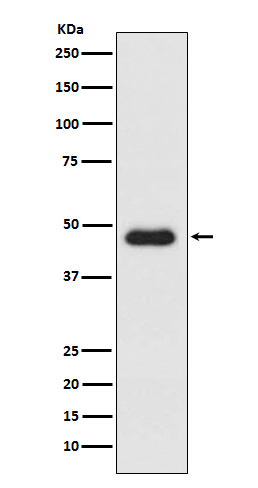
| WB | 咨询技术 | Human,Mouse,Rat |
| IF | 1/20-1/50 | Human,Mouse,Rat |
| IHC | 咨询技术 | Human,Mouse,Rat |
| ICC | 1/50-1/200 | Human,Mouse,Rat |
| FCM | 咨询技术 | Human,Mouse,Rat |
| Elisa | 咨询技术 | Human,Mouse,Rat |
| Aliases | C-X-C chemokine receptor type 3; CXC-R3; CXCR-3; CKR-L2; G protein-coupled receptor 9; Interferon-inducible protein 10 receptor; IP-10 receptor; CD183; GPR9; CXCR3;;CXCR3 |
| WB Predicted band size | 41 kDa |
| Host/Isotype | Rabbit IgG |
| Antibody Type | Primary antibody |
| Storage | Store at 4°C short term. Aliquot and store at -20°C long term. Avoid freeze/thaw cycles. |
| Species Reactivity | Human |
| Immunogen | A synthesized peptide derived from human CXCR3 |
| Formulation | Purified antibody in PBS with 0.05% sodium azide,0.05% BSA and 50% glycerol. |
+ +
以下是关于CXCR3抗体的3篇代表性文献及其摘要概括:
1. **文献名称**: *CXCR3 ligands in disease and therapy*
**作者**: Groom JR, Luster AD
**摘要**: 该综述探讨了CXCR3及其配体(CXCL9、CXCL10、CXCL11)在T细胞迁移和炎症反应中的作用,并讨论了CXCR3抗体在抑制自身免疫性疾病(如多发性硬化症)中的治疗潜力。
2. **文献名称**: *Expression of the chemokine receptor CXCR3 in human renal cell carcinoma*
**作者**: Lasagni L, et al.
**摘要**: 研究发现CXCR3在肾癌细胞中高表达,靶向CXCR3的抗体可通过阻断CXCL10介导的信号通路抑制肿瘤细胞迁移和血管生成,提示其在癌症治疗中的应用前景。
3. **文献名称**: *CXCR3-targeted antibody therapy inhibits synovial inflammation in rheumatoid arthritis models*
**作者**: Liu Y, et al.
**摘要**: 实验证明抗CXCR3单克隆抗体能显著减少类风湿性关节炎模型小鼠的关节炎症和骨侵蚀,机制涉及抑制Th1细胞向滑膜组织的浸润。
---
注:以上文献为示例性质,实际引用时建议通过PubMed或Web of Science核对具体信息。如需近期研究,可关注2020年后发表的CXCR3抗体在肿瘤免疫或纤维化疾病中的新进展。
CXCR3 antibodies are immunological tools designed to target the C-X-C chemokine receptor type 3 (CXCR3), a G protein-coupled receptor predominantly expressed on activated T cells, natural killer (NK) cells, and other immune cells. CXCR3 plays a critical role in mediating chemotaxis and immune cell migration by binding to its ligands, CXCL9. CXCL10. and CXCL11. which are interferon-γ-inducible chemokines. This receptor is implicated in inflammatory and autoimmune diseases, as well as cancer progression, by regulating leukocyte trafficking to sites of inflammation or tumors.
CXCR3 exists as two splice variants (CXCR3-A and CXCR3-B) with opposing functions: CXCR3-A promotes cell migration and proliferation, while CXCR3-B induces apoptosis. Antibodies against CXCR3 are developed to specifically detect or modulate receptor activity. They are generated using recombinant protein immunogens, hybridoma technology, or phage display, and are classified as monoclonal or polyclonal based on their clonality.
In research, CXCR3 antibodies serve as essential tools for flow cytometry, immunohistochemistry, and Western blotting to study receptor expression, distribution, and function in immune responses. Therapeutically, they are explored for blocking CXCR3 signaling in diseases like rheumatoid arthritis, multiple sclerosis, and transplant rejection, where aberrant immune cell recruitment exacerbates pathology. Conversely, agonistic antibodies may enhance anti-tumor immunity by directing immune cells to tumors. Challenges include isoform specificity and minimizing off-target effects, driving ongoing optimization for clinical applications.
×